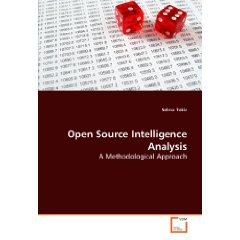
Selma Tekir
The NATO Open Source Handbook, NATO Open Source Reader, and NATO's Intelligence Exploitation of the Internet remain the three standard training documents, and all are free online.
2009 Handbook Online for Internet Tools and Resources for Creating Open Source Intelligence (OSINT) by Dr. Ran Hock, Chief Training Officer, Online Strategies, Inc. remains the best private sector offering.
Also available free online are the United Nations handbooks for law enforcement managers, analysts, and field officers.
Absent better information from the publisher using the tools that Amazon Advantage provides (such as Look Inside the Book or at least an uploaded Table of Contents, description, about the author, and ideally a sample chapter, all easy to do if the publisher is serious), this book cannot possibly be rated at more than three stars, one each for the author, the multinational aspect, and the effort to make a contribution.
The best thing about this publication is that it flags the author as a serious person who is interested in this vital topic, and that should open some paths for further pioneering.
Absent direct examination, we surmise the book is technically-focused, which is the same mistake the Central Intelligence Agency's Open Source Center (CIA OSC) is making, treating Open Source Intelligence (OSINT) as a technical collection challenge, which it is not. OSINT is Human Intelligence (HUMINT), the technical aspect is nothing more than processing, which no one is doing properly at this time for lack of a comprehensive understanding of history, culture, language, context, and timeliness.
OSINT is not OSIF (Open Source Information). By definition, OSINT must represent the process of requirements definition, collection management, source discovery and validation, multi-source fusion (at both machine speed and in multiple languages as well as human speed and multi-cultural), and it must produce actionable decision support relevant to a specific decision by a specific decision maker or decision-making group. Anything less is OSIF, not OSINT.
Use email in Contact at Phi Beta Iota the Public Intelligence Blog to reach me directly. This appraisal will be repeated there, and I will respond to comments here as well as there. Let's all talk about finally getting multinational engagement ramped up (see the DoD briefings and the Coalition Coordination Center briefing at PBI/PIB).
Should the author of this volume wish it, I will gladly post a free copy of the volume in question and then delete this negative review. Should the publisher wish it I will review and return a physical copy of this volume but I certainly am not going to pay $54 for it.
There are too few great books on OSINT and M4IS2 at this time, the best stuff is still free online (see for example Historic Contributions at Phi Beta Iota). There is certainly a need for a major compilation of new effort across all boundaries, and this thin volume at least earns an invitation to any future gathering of the pioneers. See the link to the author's web site at Phi Beta Iota.




